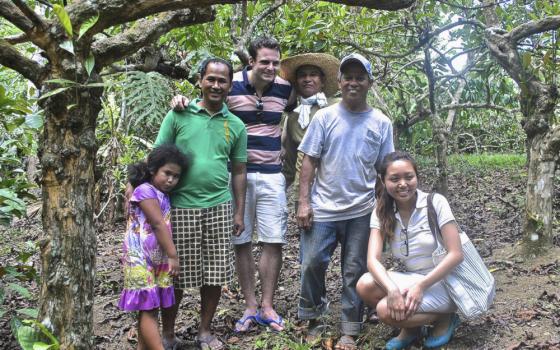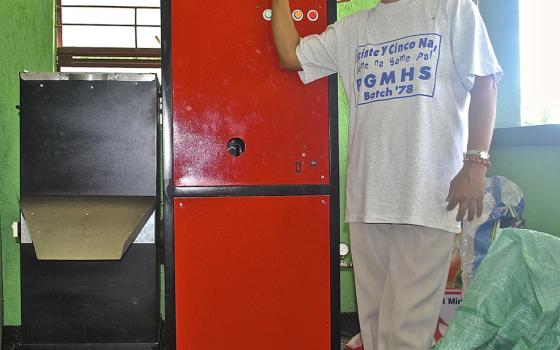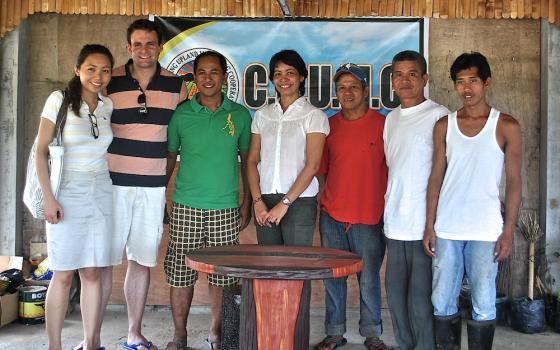Eager farmers belonging to a cooperative here milled around their open air coffee shop on a hill outside of Manila waiting to show prospective buyers from Europe their coffee plantation and processing site set up with help from Fair Trade practitioners.
Their guests, London-based Jena and Julian Krause, who drove up to the group’s AgroKafe shop in Casile, Cabuyao, Laguna, south of Manila, were gathering the best coffee beans from the Philippines to use in the business they plan to launch in London and the Philippines under the name Pamana.
“We aim to support local Filipino farmers, small-medium enterprises, and other partners from the Philippine coffee sector through sustainable and Fair Trade practices,” states the Pamana business plan.
Jojo Ablan, president of Casile-Guinting Upland Marketing Cooperative, showed the Krauses the roasting machine created by Basil Reyes, president of Bote Central, Inc., who accompanied the Krauses to Laguna. Bote Central’s Treasurer, Vie Reyes told GSR that roasting machines created by her husband and partner have been deployed to farmers’ groups around the country through a government grant. She and her husband developed them to help raise farmers’ share of the income from coffee.
Vie Reyes explained there is great difference in the income farmers get from selling raw materials compared to selling the end product. She estimates that a kilo of green Arabica coffee beans that sells for about 275 pesos (U.S. $6.30) fetches up to 1,000 pesos in roasted form, and up to a total of 3,500 pesos if sold per cup as brewed coffee.
“It’s an industry with the biggest jump in price from the raw material to the end product,” Vie Reyes noted. For this reason, part of the company’s plan is to help farmers develop their business “from soil to cup.”
Fair Trade producer
The Reyeses have been working to enable farmers develop their business since their company pioneered Philippines production of the multi-awarded and Fair Trade certified specialty coffee made from beans harvested from civet droppings.
In 2002, their company was established with a vision of “working to clean and save the environment by using agro-forest products for livelihood.”
The company is focused on the joint production and consumption program of Philippine coffee, rationalizing the supply chain and embedding Fair Trade principles to promote the Philippine coffee industry’s sustainability, and allow for growth that transforms lives of people in the grassroots, such as farmers, its profile says.
For Basil Reyes, Fair Trade is not all about money. “Fair Trade for me is about relationships – about good relationships,” he told GSR.
“You put value on the relationship and when relationships are good, everybody is gaining,” the company president said. For example, when the company gets audited for Fair Trade certification, “they don’t go through our books. They go to the people, – our neighbors, our workers and partners, Vie Reyes adds.
Fair trade trading partnership is also based on transparency and respect, which seeks greater equity in international trade.
Fair trade is hope because it provides certain precepts and principles that provide a better future, the inventor said.
In Vie Reyes’ view, fair trade should “work for the poor – for local consumption and improvement. “ she remembers the Fair Trade system used to deal mostly with high-end products that locals could not afford.
She explains that when her company goes to a community for training or other reasons, “We don’t just introduce the Fair Trade brand. It’s more the value chain that we did that we introduce, and later on the farmers realize we’re Fair Trade after all.”
“We value sharing,” said Basil Reyes, inventor of the coffee roasting machine. “Most people think their business will not grow if they share. But they are wrong because the more people share, the more money there is to go around."
For Vie Reyes, “The best pay back there is, is when you go up the mountain, where you haven’t been a long time and when people are teary-eyed to see you. You can’t put a value on that.”
“I can leave my children with them and feel assured they’ll be well taken care of. We also get many offers of land – they say Mam Vie, just put up your house here. They give you their best lot. We can build houses all over the country,” she said of the people she, her husband, and her team of resource persons have served through seminars, training, and technical help with the roaster.
“The richness of Bote Central is the transactional rules which you are supposed to apply to make the relationship flourish, because when the relationship flourishes, everything else does,” Basil Reyes said.
Bote Central has developed 41 community-based coffee enterprises. Two of them are the company’s, about 10 are privately owned and 30 are farmer-owned or run by people’s organizations.
“Whatever our company is able to do for the community we do for them. They can even have their own Chivet coffee. They just cannot call it 'Alamid,' which is their company’s name for the specialty coffee."
Coffee farmer
Andal heads a cooperative that opted to focus on agribusiness. “We have existing coffee trees so all we needed was to improve and enhance technology and our market. We’re lucky to have met Ms. Vie (Reyes) who brings in people to teach us about several things,” the co-op president told GSR.
Some 60 of the 125 members are women, many of them mothers who have little to do at home, so they help sort through coffee beans of the Robusta, Liberica (Barako) and Exelsia varieties.
Before the cooperative was formed, farmers went their own way with coffee prices.
“Many got disheartened, but later we talked about these and we agreed we shouldn’t give up with the seemingly low payment we’re getting,” Andal said.
Farmers now tend to thousands of coffee trees planted on 25 hectares of the cooperative which have been awarded to families through the government’s land reform program. Some have sold their land to buyers who offered them cash and “now their 100,000 pesos from the sale is all gone and they ended up living as caretakers on the land they owned,” Andal said.
However, he said members have agreed to preserve their land for agriculture.
[N/J.Viehland is an NCR/GSR correspondent based in the Philippines.]



